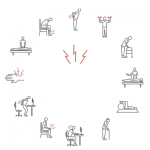
Mike Focus / shutterstock.com
CHICAGO—Although medical treatments for addiction have been proved effective, they are not used often enough, said Kenneth Stoller, MD, during a session at the 2019 ACR State-of-the-Art Clinical Symposium, held April 5–7. These treatments bring health benefits that extend beyond addiction, he said.
Dr. Stoller, assistant professor of psychiatry and behavioral sciences at Johns Hopkins University, Baltimore, said methadone, buprenorphine, naltrexone and other drugs to treat addiction are underused due to long-standing stigmas about drug use, as well as concerns about providing treatment without the support and guidance of addiction specialists. He said the medical community—including rheumatologists, whose patients require pain treatment and are susceptible to developing a use disorder—must ramp up treatment and referrals when appropriate, enabling patients to get the help they need.
“From your perspective, if you can get your patients to have their addiction treated, then this [treatment] will facilitate having [their] medical problems better addressed,” Dr. Stoller said. “This will improve medical adherence—not only [to the] medications you’re prescribing, but also [encourage patients to] come to appointments. Morbidity will decrease.” This can improve outcomes that are measures for value-based reimbursement.
He said, “[Opioid addiction] is a health crisis that was, at least in part, created and sustained by the medical system”—first by overprescribing opioids and, then, by sometimes decreasing opioids too precipitously. “Now, the medical system can effectively augment treatment by using these medications, [e.g., methadone, buprenorphine, naltrexone].”
The need for a better approach to addiction disorder certainly exists. In 2017, about 70,000 deaths from drug overdoses occurred, with over half due to opioids. And the use of, and deaths from, synthetic drugs, such as fentanyl—“the really scary stuff”—continues to increase, Dr. Stoller said.
Treatment Options
Three medications are available for treating alcohol use disorder. Disulfiram makes patients feel sick if they drink alcohol, preventing the body from getting rid of acetaldehyde and resulting in a need to monitor liver function. As with most medical treatments for addiction, adherence is a problem, Dr. Stoller said.
“Addiction is a disease that affects people’s ability to make choices that are not pro-drug,” he said. “So discontinuing one’s own disulfiram to allow for continued drinking is something we have to struggle against.”
Acamprosate has a less clear mechanism, but lowers the likelihood of drinking and has been used for a long time, particularly in Europe. But it has to be taken three times daily, and a patient “may not have the planning [ability] and executive functioning, especially early in recovery, to remember to take something three times per day.”



